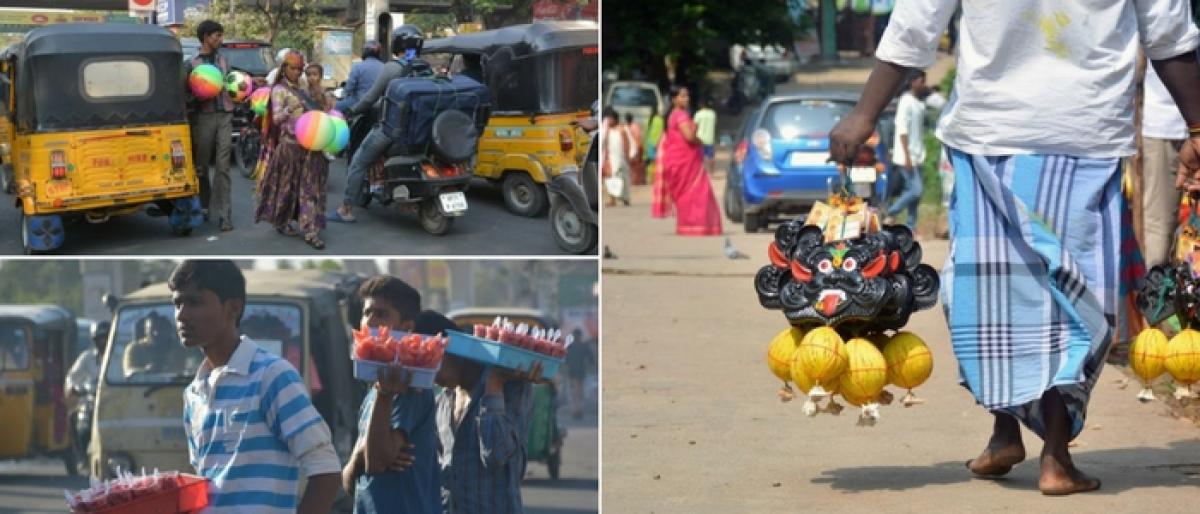Live
- Gentle in manner, resolute in convictions: Sonia Gandhi pens emotional note for Dr. Manmohan Singh
- 2024: A landmark year for India's defence achievements and breakthroughs
- 2025 Horoscopes: Insights and Guidance by Pt. Umesh Chandra Pant
- Osamu Suzuki was a legendary figure in global auto industry: PM Modi
- “AMOEBA”: Celebrating the Journey of Telugu Entrepreneur Sri Motaparti Siva Rama Vara Prasad
- Sachin Khedekar recites a poem from director Feroz Abbas Khan’s powerful new play, ‘Hind 1957’
- NABL-QCI appoints Dr. Sandip Shah as chairperson
- Centre transfers Rs 2.23 lakh crore for 1,206 schemes under Direct Benefit Transfer
- BGT 2024-25: Watching Konstas bat reminds me of Symonds, says Hayden
- 75 iconic lighthouses in India saw more than 10 lakh visitors till September
Just In

While one impatiently waits for the signal to turn green at the busy intersection of the Liberty Crossroads or, for that matter, any traffic island across Hyderabad from L B Nagar to Lingampally and A S Rao Nagar to Gachibowli, those quaintly dressed men, women and children who knock your windshields with curios, keep one entertained for the wearisome 180 seconds.
Hyderabad: While one impatiently waits for the signal to turn green at the busy intersection of the Liberty Crossroads or, for that matter, any traffic island across Hyderabad from L B Nagar to Lingampally and A S Rao Nagar to Gachibowli, those quaintly dressed men, women and children who knock your windshields with curios, keep one entertained for the wearisome 180 seconds.
They show their ware and lure you first, then demonstrate the cute little stuff and if you leave any sign of interest, make you haggle for half their rates. Their merchandise includes comic books for children, accessories and cleaning devices for your car, small toys, display items, balloons, rubik cube and many more.
At a time when any purchase, big or small, can be done through smart phones and internet, these petty traders, mostly from the begging clan, carry out their business with ease and earn their bread too.
And when brand India is busy talking about entrepreneurship, there is something to learn from these children of lesser Gods. It is true that today’s youth prefer to take risk and start their own ventures than to go for high-paying jobs, most of the start-ups fail to make it big. But the spirit of petty traders, be it at traffic joints or the myriad footpaths, prove to be unflinching.
Babita from Sikar district of Rajasthan, who now sells umbrellas at Telugu Talli flyover near the Secretariat in Hyderabad till recently sold small toy dogs that decorate dashboard. With the change of season, she chose to sell umbrellas that see brisk business as the monsoon has set in.
She buys colourful umbrellas that are sure to catch the imagination of all and sundry from old city’s Begum Bazaar for Rs 90 each.
With her own inherent acumen and disarming smile, Babita offers to sell the umbrellas for Rs 350 each. Her chance customer, as usual, makes a bargain. And after a short discussion, she manages to sell the item for anything between Rs 150 and Rs 200. The signal turns green, and the happy customer goes.
These vendors – mostly women and children – earn anything between Rs 100 and Rs 1,000 a day by selling knick-knacks at the busy intersections. Children hand over the earning to their parents as the whole family works as a team. “Sometimes I earn up to Rs 1,000, sometimes very less.
I have to walk barefoot on the scorching road in summer and get drenched during monsoon. But this is my bread and would love to do the job,” says Babita. According to two surveys carried out by NGO CHETNA and Plan India, most of these families that include both beggars and petty traders come to bigger cities from water-scarce districts of Rajasthan.
Like these enthusiastic street entrepreneurs, others like 35-year-old Sakshi sell their self-made crafts on footpaths. Sakshi, an idol-maker from Rajasthan’s Karauli district, makes her own little clay idols at her tarpaulin tent in the backstreets of busy Nagole-Uppal main road, and sells them on footpaths.
These idols and other crafts priced anything between Rs 100 and Rs 5,000 fetch them a meagre profit that is hardly enough for their survival. Other than festive seasons, they live their lives in penury, yet stick to their trade, come what may.
As the country is witnessing a start-up boom, with a little over 3,100 start-ups, and closely behind UK with 4,000 start-ups, one can learn the spirit of entrepreneurship from these wayside vendors.
According to the surveys, 27 per cent of those worked spent more than 10 hours daily on the streets, whereas 60 per cent spent 7-10 hours and 13 per cent 3-6 hours.
Chetna’s Sanjay Gupta says Chetna’s work with Plan India to rehabilitate the children involved in begging or selling failed to effect the desired results because there was no integrated rehabilitation plan for child beggars and sellers.
“Until you link them with the government schemes for the marginalised, it is impossible to give them any hope of life beyond begging and selling on the streets,” he adds.

© 2024 Hyderabad Media House Limited/The Hans India. All rights reserved. Powered by hocalwire.com







